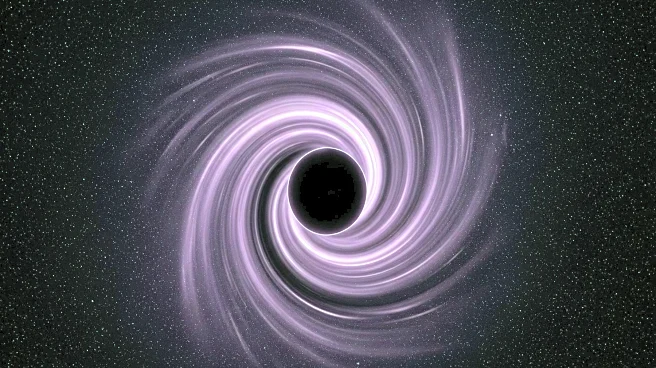What's Happening?
Physicists have issued a warning about a primordial black hole that could explode within the next decade, potentially leading to a cosmic event of unprecedented scale. This black hole, believed to have formed shortly after the Big Bang, has a 90% chance of exploding by 2035, according to researchers at the University of Massachusetts Amherst. Primordial black holes differ from typical black holes, which form from the collapse of massive stars. Instead, they are thought to have originated from the conditions present in the early universe. The explosion of such a black hole could release a variety of fundamental particles, some of which have not yet been observed, offering a unique opportunity to unlock secrets of the universe. The study, published in the Physical Review Letters journal, highlights the potential for observing Hawking radiation, a theoretical concept proposed by physicist Stephen Hawking, which suggests that black holes emit radiation as they lose mass.
Why It's Important?
The potential explosion of a primordial black hole could have significant implications for the field of physics, offering insights into the fundamental particles that make up the universe. Observing such an event could provide evidence for the existence of primordial black holes and confirm the presence of Hawking radiation, which has been a theoretical concept for decades. This could revolutionize our understanding of black holes and the early universe, potentially rewriting the history of cosmic evolution. The ability to detect and study these particles could lead to advancements in particle physics and cosmology, impacting scientific research and technology development. The event could also stimulate further investment in astronomical observation technologies and international collaboration in space research.
What's Next?
Researchers are preparing to observe the potential explosion using advanced telescopes and other technologies capable of detecting the emitted particles. While the event will not be visible to the naked eye, the scientific community is gearing up to capture and analyze the data that could emerge from this cosmic phenomenon. The findings could lead to new theories and models in physics, prompting further studies and experiments. Scientists are also considering the implications for future space missions and the development of new technologies to explore and understand the universe. The anticipation of this event may drive increased funding and interest in astrophysics and related fields.
Beyond the Headlines
The potential explosion of a primordial black hole raises ethical and philosophical questions about humanity's role in observing and understanding the universe. It challenges our perception of cosmic events and the limits of scientific knowledge. The event could also influence cultural narratives about the universe and our place within it, sparking public interest and debate about the mysteries of space. Additionally, the study of such phenomena may lead to discussions about the environmental impact of space exploration and the sustainability of scientific endeavors in the cosmos.









